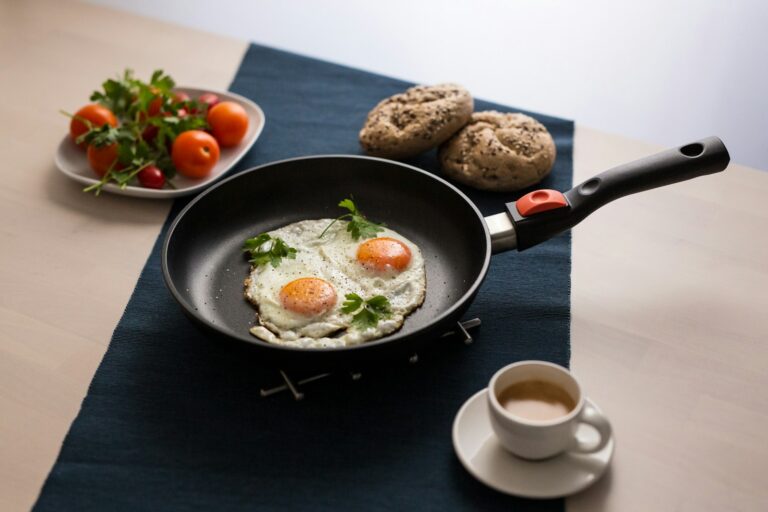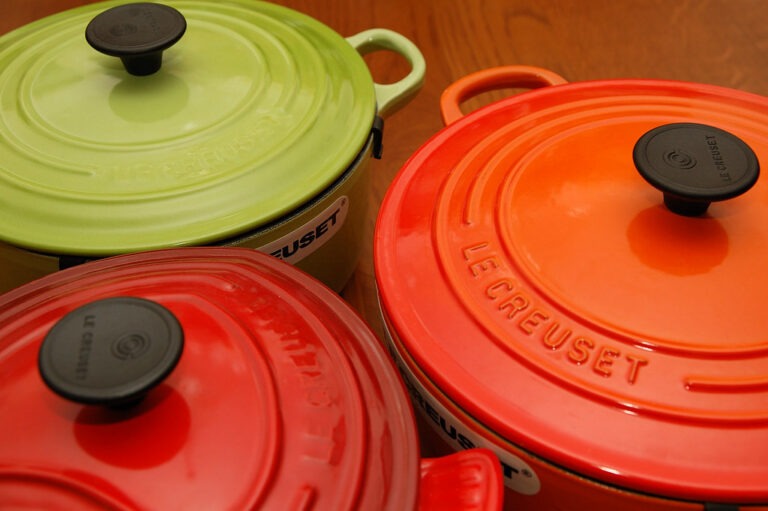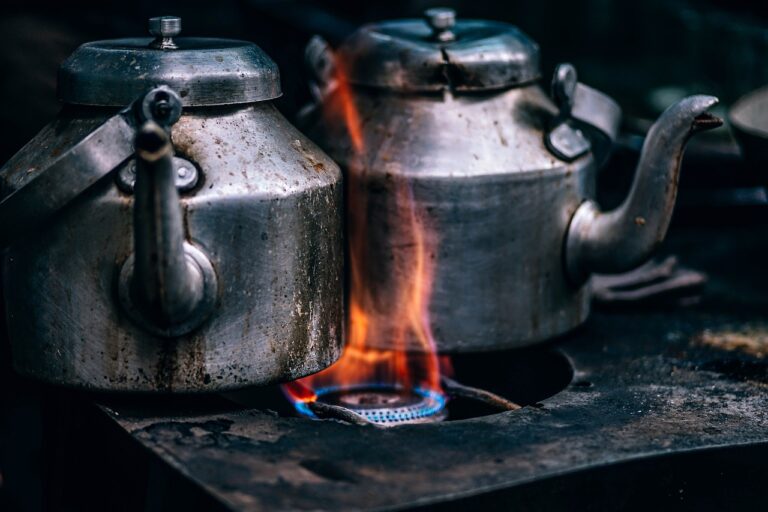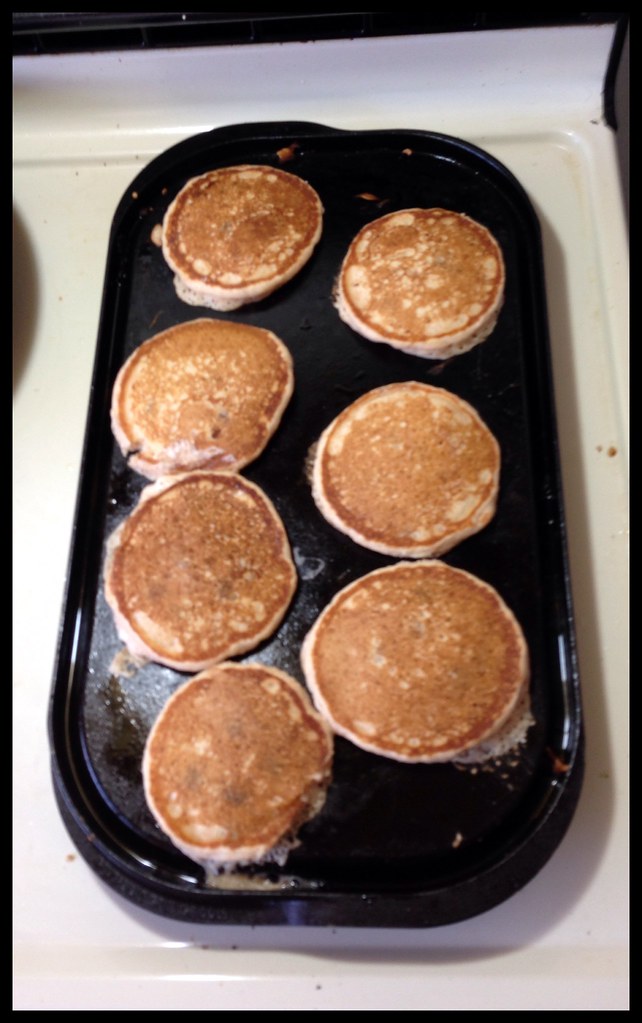I’ve always been a fan of cooking with cast iron pans, but I recently realized that different stovetops can affect the performance of these versatile cookware.
In this article, I’ll share my experiences and insights on using cast iron pans on gas, electric, induction, ceramic, and dual fuel stovetops.
From heat distribution to maintenance tips, you’ll find everything you need to know about achieving the perfect results with your beloved cast iron pans on any type of stovetop.
Key Takeaways
- Cast iron pans are compatible and work effectively on gas, electric, and dual fuel stovetops.
- Electric stovetops provide good contact and even heat distribution for cast iron pans.
- Induction and ceramic stovetops may not be ideal for using cast iron pans due to potential heat transfer issues and the risk of scratching the surface.
- Regular seasoning and extra care are necessary when using enamel-coated cast iron pans on dual fuel stovetops to avoid chipping or damage.
Gas Stovetops and Cast Iron Pans
If you’re using a gas stovetop, you’ll find that cast iron pans work exceptionally well due to their ability to distribute heat evenly. I’ve been cooking with cast iron pans on my gas stove for years, and I can attest to the fantastic results they deliver.
The heavy-duty construction of cast iron allows it to hold and retain heat effectively, ensuring that your food cooks evenly and thoroughly. Whether I’m searing a steak or sautéing vegetables, the consistent heat distribution of my cast iron pan helps me achieve perfect results every time.
Additionally, the high heat capacity of cast iron makes it ideal for achieving a nice char or crust on foods like burgers or cornbread. Overall, using a cast iron pan on a gas stovetop is a winning combination for any home cook.
Electric Stovetops and Cast Iron Pans
Electric stovetops work well with cast iron pans. I love using my cast iron skillet on my electric stovetop because it distributes heat evenly and maintains a consistent temperature.
The smooth surface of the stove allows for a good contact between the pan and the heat source, resulting in excellent cooking performance. Whether I’m searing steaks or sautéing vegetables, my cast iron pan on an electric stovetop never disappoints.
Additionally, the heavy weight of the cast iron helps to prevent hot spots and ensures that food cooks uniformly. Cleaning up is also a breeze since most electric stovetops have smooth surfaces that are easy to wipe clean.
Overall, I find that using cast iron pans on my electric stovetop enhances the cooking experience and produces delicious meals every time.
Induction Stovetops and Cast Iron Pans
When cooking on induction stovetops, it’s important to note that cast iron pans may not work as effectively. While they are known for their ability to distribute heat evenly and retain it well, induction stovetops require a different type of cookware due to their unique heating mechanism.
Here are four reasons why cast iron pans may not be the best choice for induction stovetops:
- Non-Magnetic Material: Induction stovetops rely on magnetic fields to generate heat, and unfortunately, cast iron pans are not always magnetic. This means that they won’t be able to efficiently transfer heat from the stove to the pan.
- Uneven Heating: Induction cooktops heat up quickly, but they do so in a concentrated manner through electromagnetic waves. Cast iron pans may not respond as well to this intense heat, resulting in uneven cooking.
- Risk of Scratching: The glass surface of induction stovetops can be easily scratched by rough-bottomed cookware like cast iron pans. This can damage both the pan and the stovetop itself.
- Weight Considerations: Cast iron pans tend to be heavy, and this weight can make them cumbersome when used on an induction stove. It’s important to consider both the weight of the pan and your own comfort while cooking.
Ceramic Stovetops and Cast Iron Pans
Ceramic stovetops may not be compatible with cast iron cookware, as these pans can potentially scratch the delicate surface. I learned this the hard way when I used my trusty cast iron skillet on my new ceramic stovetop.
As I was cooking, I noticed a harsh scraping sound and realized that my pan was leaving scratches on the smooth ceramic surface. Not only did it ruin the appearance of my stovetop, but it also affected its functionality. The scratches made it difficult to clean and caused uneven heating.
From then on, I decided to reserve my cast iron pans for other types of stovetops like gas or electric. It’s important to always check your appliance’s compatibility before using any cookware to prevent any unwanted damage or accidents.
Dual Fuel Stovetops and Cast Iron Pans
If you’re considering a dual fuel stovetop, keep in mind that it’s important to be cautious when using certain types of cookware. Here are some things to consider:
- Cast Iron is versatile: One of the great things about cast iron pans is their ability to be used on different types of stovetops, including dual fuel. They distribute heat evenly and retain it well, making them perfect for cooking on gas burners or electric ovens.
- Avoid glass or ceramic cookware: While cast iron works well on dual fuel stovetops, it’s important to avoid using glass or ceramic cookware on high heat settings. These materials can crack or shatter due to rapid temperature changes.
- Use caution with enamel-coated cast iron: Enamel-coated cast iron pans can also be used on dual fuel stovetops but need extra care. Avoid overheating them as the enamel coating may chip or become damaged.
- Season your cast iron pans regularly: To maintain the non-stick properties of your cast iron pans, make sure to season them regularly by applying a thin layer of oil and heating them in the oven.
Remember these tips when using your trusty cast iron pans on a dual fuel stovetop for delicious and hassle-free cooking!
Conclusion
In conclusion, I’ve found that cast iron pans can be successfully used on all types of stovetops. Whether it’s a gas stove, electric stove, induction stove, ceramic stove, or even a dual fuel stove, the versatility of cast iron pans shines through.
They provide excellent heat distribution and retention, making them ideal for various cooking techniques. So no matter what type of stovetop you have, rest assured that your trusty cast iron pan will always deliver delicious results.



